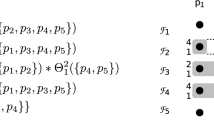Abstract
The main objectives of data replication are improved availability and reduced communications cost for queries. Maintaining the various copies consistent, however, increases the communications cost incurred by updates. For a given degree of replication, the choice of a specific concurrency control algorithm can have a significant impact on the total communications cost. In this paper we present various models for analyzing and understanding the trade-offs between the potentially opposing objectives of maximum resiliency and minimum communications cost in the context of the quorum consensus class of algorithms. It is argued that an optimal vote assignment is one which meets given resiliency goals and yet incurs the least communications cost compared with all other alternative assignments. A mathematical model for vote assignment is developed, and optimal algorithms are presented. It is demonstrated that significant cost savings can be realized from these approaches.
This research was supported by the U.S. Army Information Systems Engineering Command via an interagency agreement with the U.S. Department of Energy Applied Mathematics Sciences Research Program of the Office of Energy Research under contract DE-AC03-76SF00098, and by an Arthur Andersen & Co. Foundation Doctoral Dissertation Fellowship.
Preview
Unable to display preview. Download preview PDF.
Similar content being viewed by others
References
Barabara, D., Garcia-Molina, H., and Spauster, A., “Protocols for Dynamic Vote Reassignment”, Technical Report, Department of Computer Science, Princeton University, May 1986.
Bernstein, P., Hadzilacos, V., and Goodman, N., “Concurrency Control and Recovery in Database Systems”, Addison Wesley Publishing Co., 1987.
Davidson, S. B., Garcia-Molina, H., and Skeen, D., “Consistency in Partitioned Networks”, ACM Computing Surveys 17(3), September 1985.
Eager, D.L., “Robust Concurrency Control in Distributed Databases”, Technical Report CSRG #135, Computer Systems Research Group, University of Toronto, October 1981.
Eager, D.L., and Sevcik, K.C., “Achieving Robustness in Distributed Database Systems”, ACM Trans. Database Syst. 8(3):354–381, September 1983.
El Abbadi, A., Skeen, D., and Cristian, F., “An Efficient, Fault-Tolerant Protocol for Replicated Data Management”, Proc. 4th ACM SIGACT-SIGMOD Symp, on Principles of Database Systems, pages 215–228. Portland, Oregon, March 1985.
Garcia-Molina, H., and Barbara, D., “Optimizing the Reliability Provided by Voting Mechanisms”, Proc. 4th International Conference on Distributed Computing Systems, May 1984.
Garcia-Molina, H., and Barbara, D., “How to Assign Votes in a Distributed System”, Journal of ACM, Vol. 32, No. 4, October 1985.
Gifford, D.K., “Weighted Voting for Replicated Data”, Proc. 7th ACM SIGOPS Symp. on operating Systems Principles, pages 150–159. Pacific Grove, CA, December 1979.
Gray, J., “Notes on Data Base Operating Systems,” in Operating Systems: An Advanced Course, Springer-Verlag, 1978, pp393–481.
Herlihy, M., “Dynamic Quorum Adjustment for Partitional Data”, ACM TODS, Vol 12, No 2, June 1987.
Jajodia, S. and Mutchler, D., “Dynamic Voting”, Proc. 1987 ACM SIGMOD, San Francisco, CA, May 1987.
Reed, D., “Naming and Synchronization in a Decentralized Computer System,” Ph.D. Thesis, Department of Electrical Engineering and Computer Science, M.I.T., 1978.
Schrage, L., “LINDO”, Scientific Press, 1986.
Thomas, R. H., “A Majority Consensus Approach to Concurrency Control,” TODS, June 1979.
Author information
Authors and Affiliations
Editor information
Rights and permissions
Copyright information
© 1988 Springer-Verlag Berlin Heidelberg
About this paper
Cite this paper
Kumar, A., Segev, A. (1988). Optimizing voting-type algorithms for replicated data. In: Schmidt, J.W., Ceri, S., Missikoff, M. (eds) Advances in Database Technology—EDBT '88. EDBT 1988. Lecture Notes in Computer Science, vol 303. Springer, Berlin, Heidelberg. https://doi.org/10.1007/3-540-19074-0_66
Download citation
DOI: https://doi.org/10.1007/3-540-19074-0_66
Published:
Publisher Name: Springer, Berlin, Heidelberg
Print ISBN: 978-3-540-19074-5
Online ISBN: 978-3-540-39095-4
eBook Packages: Springer Book Archive




